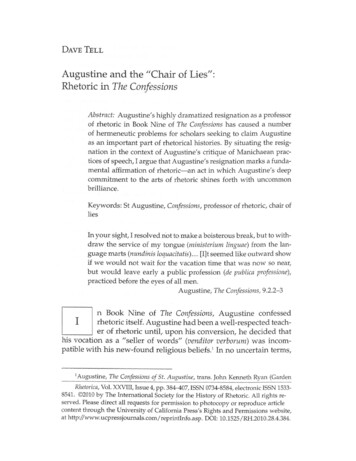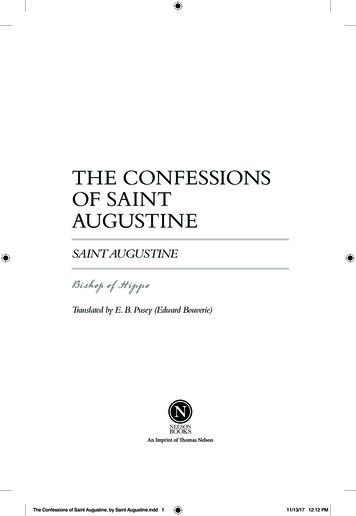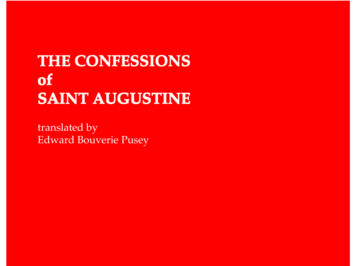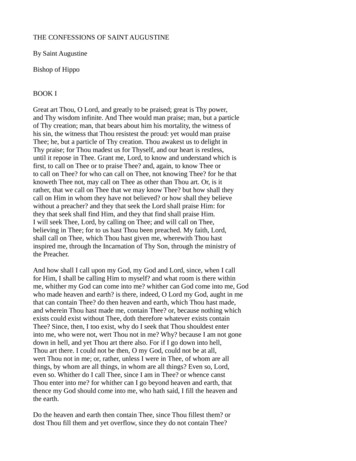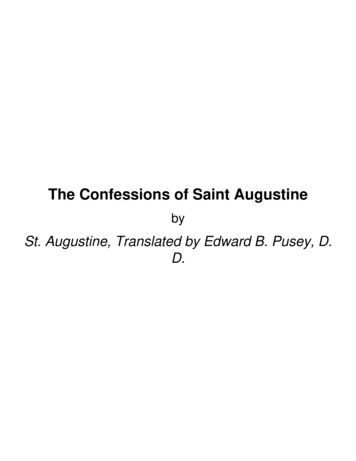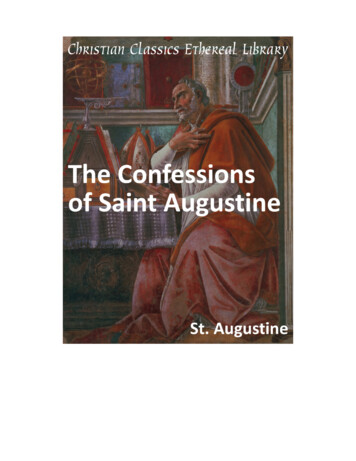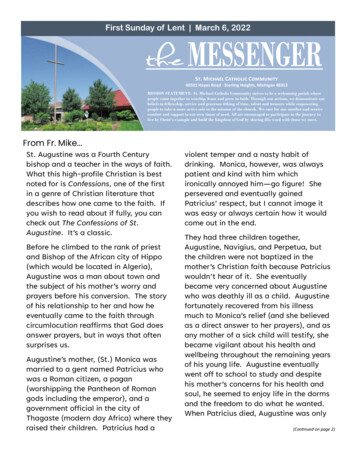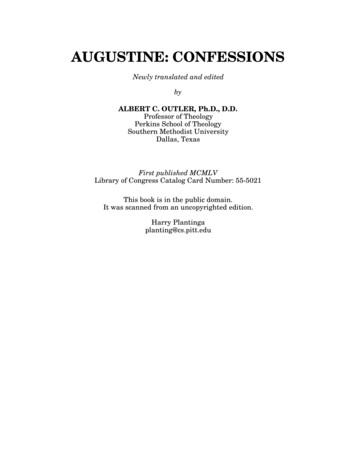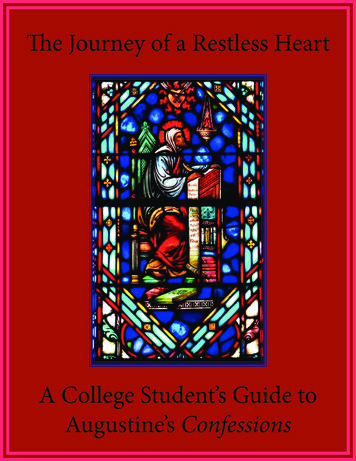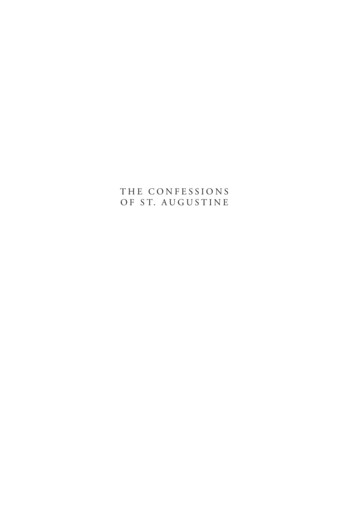
Transcription
The confessionso f St. A u g u s t i n e
Paraclete EssentialsConfessions ofSaint AugustineThes t. a u g u s t i n e o f h i p p oEdited by Hal M. Helms, Foreword by Fr. Mark Henningerco nte m p o ra ry e n g l i s h e d i t i o n Paraclete PressBrewster, Massachusetts
The Confessions of St. Augustine2010 First PrintingCopyright 2010 by The Community of Jesus, Inc.ISBN 978-1-55725-695-9Library of Congress Cataloging-in-Publication DataAugustine, Saint, Bishop of Hippo.[Confessiones. English]The confessions of Saint Augustine / St. Augustine of Hippo ; edited by HalM. Helms ; foreword by Mark Henninger. -- Contemporary English ed.p. cm. -- (Paraclete essentials)Includes bibliographical references (p.).ISBN 978-1-55725-695-91. Augustine, Saint, Bishop of Hippo. 2. Christian saints--Algeria--Hippo(Extinct city)--Biography. I. Helms, Hal McElwaine. II. Title. BR65.A6E52010270.2092--dc22[B]201000324710 9 8 7 6 5 4 3 2 1All rights reserved. No portion of this book may be reproduced, stored in anelectronic retrieval system, or transmitted in any form or by any means—electronic, mechanical, photocopy, recording, or any other—except for briefquotations in printed reviews, without the prior permission of the publisher.Published by Paraclete PressBrewster, Massachusettswww.paracletepress.comPrinted in the United States of America
W Contents Wf o r e w o rdby the Rev. Mark G. Henninger, sji n tr o d u c t i o okbookbookbooki Infancy to Age FifteeniiObject of These ConfessionsiiiFrom Age Sixteen to Eighteeniv From Age Eighteen to Twenty‑sevenvAt Age Twenty‑eightviAt Age Twenty‑nineviiAt Age Thirtyviii At Age Thirty‑oneixAt Age Thirty‑twoxThe Examined Lifexi Inquiry into Creation and Timexii Further Inquiry into the Mysteryof Creationbook xiii From Inquiry to PraiseN o t e sviivix32537557595119145169195243271303341
W F o r e w o rd WIwas introduced to St. Augustine’s Confessions in college, andto this day I’m surprised at the impact this book had onme. Sometimes, as the saying goes, “heart speaks to heart.” Andalthough there were many voices calling to me in those years—voices of the popular culture, voices from other writers andteachers, voices of friends—that of Augustine spoke to more levelsof my personality and more powerfully than any that I recall. I amnot alone.It is still a mystery how St. Augustine has managed to do this,generation after generation, for over fifteen hundred years. It issimilar to going to a movie and hearing spoken and acted outfeelings and desires, thoughts and intimations that you wereonly dimly aware of and could never articulate, but knew werehaving a profound impact on your life. How could the screenwriter possibly know me so well? we might wonder to ourselves.The answer lies, of course, in the fact that we are not islands; weare not alone; rather, we are, all of us, human.But what is it to be human? St. Augustine understood it interms of what is called Christian neo-Platonism, a synthesis ofChristianity and the philosophy of neo-Platonism originatingin the pagan mystic and thinker Plotinus. Neo-Platonism canbe summarized in these terms: a theory of the universea theory of human naturea diagnosis of what is wrong with us; anda prescription of what is to be done about it.For Augustine, the answers to these four issues were roughlyas follows: The whole cosmos is made up of a material, changingworld and a spiritual, unchanging world.
viii The Confessions of Saint Augustine We are basically souls, belonging to the spiritual world.But we have “fallen” into this changing, material world.And it is only with God’s help in Jesus Christ that wecan “turn back” to the true homeland, the place where wereally belong—our spiritual home.Hence, to be human, for St. Augustine, is to be caught up inthe drama of a soul, fallen yet called to beatitude, true and abidinghappiness. All the longings, missed opportunities, and looking forlove in all the wrong places that characterize our existence, he seeswithin this framework.It is perhaps for this reason that so many people have beenmoved and changed by reading the Confessions. For those caughtup in the whirlwind of their own unhappiness, the Confessionsafford not an artificial safe harbor, but a real and profound understanding of their predicament.St. Augustine knows from his own experience how bitter it can beto be “lost in a dark wood,” as Dante wrote about nine hundred yearslater. But he also knows of God’s saving grace that never left him, anddoes not leave us today. This grace finds us in such a miserable state,and yet it reaches down, calling us to “turn away” from our over-thetop desires for the beautiful things of this world; with his mighty handGod breaks the chains, the obsessions, that bind us.The Confessions are, in essence, a hymn to this grace of God,and a confession—not primarily of Augustine’s sins—but of aGod who is great in his compassion. Like the Good Samaritanin St. Luke’s Gospel who stops on his way to help the travelerlying at the side of the road, God pours out the oil of his graceto heal our self-inflicted wounds.St. Augustine wrote his Confessions when he was bishop in thesmall northern African town of Hippo, as he was looking back onhis life, astounded at what had happened to him. It was the record
Foreword ixof an encounter with God. Not only one encounter, but many! Hesaw his life in a new light, discovering to his delight and astonishment that God had been calling him constantly: throughhis mother Monica, through the death of a friend, throughhis disillusionment with Faustus (the leader of the sect of theManicheans with which Augustine spent many years), throughhearing the stories of St. Anthony in the desert, through listeningto the homilies of St. Ambrose in Milan, and through his mindand-heart-wrenching battles with his own sexuality.Only as bishop, after his conversion, halfway through his life, did St.Augustine realize that each of these experiences, and countless more,were so many ways God had been calling to him. “And behold, youwere within, but I was outside, searching for you there. . . . You werewith me, but I was not with you.” How deaf he had been to God’sinner call! “Too late have I loved you, O Beauty, ancient yet ever new.Too late have I loved you!”We need not adopt the whole of the neo-Platonic outlook, withits devaluation of the body and material reality, to be moved bySt. Augustine’s account of his life. For he wrote the Confessions toawaken others to this inner voice of God, insistently calling us totrue inner peace and our inheritance as children of God. We whoare made for communion with a loving God are called to a lifemuch better than we ever imagined. The life of a Christian is to bea disciple of Jesus Christ, the “inner teacher.” Listen to this voice,for as Augustine famously says, “You have made us for Yourself,and our hearts are restless until they rest in You.”—Rev. Mark G. Henninger, sjMartin Chair of Medieval PhilosophyDepartment of PhilosophyGeorgetown University
W I n tr o d u c t i o n WAugustine stands as one of the greatest and most influential ofChristian theologians. “It may be safely predicted, that whilethe mind of man yearns for knowledge, and his heart seeks rest, theConfessions will retain that foremost place in the world’s literaturewhich it has secured by its sublime outpourings of devotion and1profound philosophical spirit.”It should be borne in mind that the Confessions was not intendedto be an intellectual exercise, removed from the everyday realitiesof life. In it, Augustine seeks to lay bare his heart, his soul—beforeGod and before his fellow men. It is an honest book and a bookthat speaks to the heart first of all.We moderns may find some difficulty in his allegorizations,especially those found in the last three books. But one translatoraptly remarked, “Where the strict use of history is not disregarded, (to use Augustine’s expression), allegorizing, by way ofspiritual meditation, may be profitable.” Certainly his insightsare not to be despised!Born in 352, in the small city of Tagaste, Africa (in what is nowAlgeria), Augustine lived in the time of the growing ascendancy ofthe Christian Church and the growing decline of the Roman empire.It was scarcely a quarter of a century earlier that the great Councilof Nicaea had been held, and there were heresies and schismsthroughout the Christian world that still held sway over heartsand minds. Donatists continued to hold that many Catholicorders were invalid because they came through traditori (thosewho had denied the faith during the severe persecution and hadlater repented and been restored to the Church). In his later yearsAugustine would spend much effort in fighting for the unity of
xii The Confessions of Saint Augustinethe Church against their schismatic beliefs. Arianism (denyingthe full divinity of Christ) succeeded in winning the allegianceof the Emperor and his mother, and echoes of that threat to thepeace and unity of the Church continued to resound throughoutAugustine’s lifetime. But for Augustine personally, his sojournamong the Manicheans gave the background for much of thematerial we find in the Confessions. After his schooling undera harsh tutor in Tagaste, he was sent to Madaura for a time.Family finances forced his return home and resulted in an idleyear, 369–70. He was then sent to Carthage, to what would beequivalent to a university, where he distinguished himself inthe rhetorical school. His father died in 371, but his mothercontinued to support his schooling with the aid of a wealthypatron, Romanianus. It is evident that she continued to cherishhigh ambitions for his worldly success. While at Carthage,Augustine came under the influence of the Manicheans and tooka mistress, to whom he was faithful for fifteen years. To them wasborn one son, Adeotus.After some years of teaching at Carthage, Augustine decided togo to Rome. His mother opposed the idea, but could not dissuadehim. After a brief stay in Rome, he was appointed in 385 asPublic Teacher of Rhetoric at Milan, where he first came underthe influence of St. Ambrose. In 385–86, the Empress Justinademanded the surrender of two churches to the Arians. Ambroseled his people in a refusal to surrender the churches, even whenconfronted by military force. Augustine was aware of this crisis,but he was not personally involved.Ten years spent with the Manicheans had brought Augustinemany intellectual difficulties with their system. Although they hadencouraged his own skeptical approach to the Holy Scriptures,they had not satisfied his thirst for sure knowledge nor his growinguneasiness with his disorderly life. With his mother’s help, Augus-
Introduction xiiitine’s mistress was dismissed and arrangements were made for hismarriage, which had to be postponed because his intended wasunderage. But his struggles with the flesh resulted in his taking anew mistress, because he felt morally incapable of making a betterchoice. He chronicles the inner struggles which led, with timelyhelp from Ambrose, to his departure from the Manicheans andhis conversion to the Catholic faith. He was baptized at Easter,387, along with his son, Adeotus. Having resigned his positionas professor of rhetoric, he and his company were waiting for aship to make their way back to Africa when his mother suddenlybecame ill and died at Ostia, the port of Rome.The next year, having returned to Tagaste and sold his propertythere, Augustine set up a monastic kind of community with a fewfriends, continuing his writing. In 391, with much misgivingon his part, he consented to be ordained presbyter at Hippo, anearby city of about 30,000. The Church was not strong there,its population being a mixture of pagans, Jews, several schismaticsects, and a large group of Donatists. In 395 (in violation of theeighth canon of Nicaea) he was made assistant bishop to the agedValerius, and succeeded him as bishop the following year.It was not long after his election as bishop that he began theConfessions, completing them probably in 398. Thus they representhis thought and the account of his life in its midstream. He wrotethis book “at the request of friends who begged him to committo writing those recollections of his former life to which he oftenreferred in private conversation. He consented for the characteristicreason that he desired his friends to mourn and rejoice along withhim as they followed his retrospect of past years, and on his behalf2to give thanks to God.”Augustine’s years as bishop involved struggles with errors hebelieved to be a threat to salvation and to the welfare of the Churchon several fronts: Manicheans, Donatists, Arians and Pelagians. In
xiv The Confessions of Saint Augustineaddition to these very real battles, the Roman empire itself wasunder mortal assault. It is one of the great ironies of history thatas Augustine finished his immortal City of God in the quiet of hismonastic residence, the Vandals were pillaging the countryside ofNorth Africa. “While the Vandals besieged Hippo, St. Augustinedied (August 28, 410) in the sanctity and poverty in which he hadlived for many years. Shortly afterward, the Vandals destroyed the3city, but left his cathedral and library untouched.”Sending the Confessions to a friend, Augustine wrote, “In thesebehold me, that you may not praise me beyond what I am. Believe4what is said of me, not by others, but by myself.”
W Ac k n ow l e d g m e n ts WThe older translations of the Confessions are, unfortunately,obscure in many places, making it increasingly difficult forthe modern reader to see Augustine as the living, vital person hemust have been. I have made free use of all the English versionsavailable (and am indebted to them all), comparing them withthe Latin version by Gibb and Montgomery. As in other modernversions, I have taken the liberty of removing some of the unnecessary conjunctions and shortening some of the most lengthy anddifficult sentences. Throughout, the pronoun you is used ratherthan Thee in addressing God, consistent with a growing practiceamong Christians.The manuscript has been read by several friends and colleagues (several times!). They are the Revs. H. Arthur Lane,Ronald Minor, Shelton Johnson, and Dr. William Showalter, andSister Constance Ayers—all of whom made helpful suggestions.Miss Gertrude Andersen has graciously and efficiently proofreadmy typewritten texts at several levels of their evolution. To all ofthem I give “humble and hearty thanks.” I am grateful, too, to thepeople of Paraclete Press who suggested that we add this volume tothe Living Library series. It goes forth with the prayer that thosewho read it will not only come to know Augustine better, but beencouraged to know better the same Lord he knew and loved.—Hal M. Helms
Confessions ofSaint AugustineThe
Wbook IWInfancy to Age FifteenoneYou are great, O Lord, and greatly to be praised. Great is your power,and your wisdom is infinite.l And man would praise you; man, whois but a small particle of your creation; yes, man, though he carrieswith him his mortality, the evidence of his sin, the evidence thatyou resist the proud; yet man, but a particle of your creation,would praise you.2You awake us to delight in your praise; for you made us foryourself, and our hearts are restless until they rest in you.Grant me, Lord, to know and understand which of these is mostimportant, to call on you or to praise you. And again, to know youor to call on you. For who can call on you without knowing you?For he who does not know you may call on you as other than youare. Or perhaps we call on you that we may know you? But howshall they call on him in whom they have not believed? or how shallthey believe without a preacher? And they who seek the Lord shallpraise him. For they that seek shall find him, and those who findshall praise him. Let me seek you, Lord, by calling on you, andcall on you believing in you, for you have been preached to us.My faith calls on you, Lord, the faith you have given me, the faithyou have breathed into me through the incarnation of your Son,through the ministry of the preacher.3
4 The Confessions of Saint AugustinetwoBut how shall I call upon my God, my God and Lord? For whenI call on him, I ask him to come into myself. And what room isthere in me, where my God can come—God who made heavenand earth? Is there anything in me, O Lord my God, that cancontain you? Indeed, do heaven and earth which you have made,and in which you made me, contain you? Or, since nothing couldexist without you, does every existing thing contain you? Why,then, do I ask that you come into me, since I, too, exist—I whocould not exist if you were not in me? Why do I say this? Becauseeven if I were in hell, yet you would be there also. For if I go downinto hell, you are there. I could not exist then, O my God, couldnot exist at all, unless you were in me. Or should I not rather say,I could not exist unless I were in you, from whom are all things, bywhom are all things, and in whom are all things.Even so, Lord, even so. Where do I call you to come, since Iam in you? Or whence can you enter into me? For where beyondheaven and earth could I go that my God might come there intome, who has said, I fill the heaven and the earth?threeDo the heaven and earth then contain you, since you fill them?Or do you fill them and yet overflow, since they cannot containyou? And where, when the heaven and earth are filled, do youpour forth that which remains of yourself? Or indeed, is thereno need that you who contain all things should be contained byanything, since those things you fill, you fill by containing them?For the vessels that you fill do not sustain you, since even if theywere broken, you would not be poured out. And when you arepoured out on us, you are not cast down, but we are uplifted. Youare not dissipated, but we are drawn together. But as you fill all
Infancy to Age Fifteen 5things, do you fill them with your whole self, or, since all thingscannot contain you wholly, do they contain part of you? Do theyall contain the same part at once, or has each its own proper part—the greater more, the smaller less? If this is so, then is one partof you greater, another less? Or are you wholly everywhere, whilenothing altogether contains you?fourWhat are you then, my God—what, but the Lord God? Forwho is Lord but the Lord? Or who is God save our God? Most high,most excellent, most powerful, most almighty, most merciful,and most just; most hidden, yet most present; most beautiful, andmost strong; stable, yet mysterious; unchangeable, yet changing allthings; never new, never old; making all things new and bringingage upon the proud, though they know it not; ever working, yetever at rest; still gathering, yet lacking nothing; sustaining, fillingand protecting; creating, nourishing, and maturing; seeking, yetpossessing all things. You love without passion; you are jealouswithout anxiety; you repent, yet have no sorrow; you are angry, yetserene; change your ways, yet your plans are unchanged; recoverwhat you find, having never lost it; never in need, yet rejoicing ingain; never covetous, yet requiring interest. You receive over andabove, that you may owe—yet who has anything that is not yours?You pay debts, owing nothing; remit debts, losing nothing. Andwhat have I now said, my God, my life, my holy joy—what is this Ihave said? Or what do any say when they speak of you? Yet woe tothose who keep silence, since those who say most are as the dumb!
6 The Confessions of Saint AugustinefiveOh, how shall I find rest in you? Who will send you into myheart to flood it, that I may forget my woes and embrace you, myonly good? What are you to me? In your pity, teach me to speak.What am I to you that you demand my love, and if I do not give itare angry with me and threaten me with great sorrows? Is it then,a slight sorrow not to love you? Oh, alas! for your mercies’ sake, OLord my God, tell me what you are to me. Say to my soul, “I amyour salvation.” When I hear this word, may I run and lay hold ofyou. Hide not your face from me. Let me see it, though I die, for Ishall assuredly die if I do not see it.4The house of my soul is narrow; enlarge it, that you may enterin. It is in ruins! Repair it! It has in it that which must offend youreyes. I confess and know it. But who shall cleanse it, or to whomshall I cry, but to you? Lord, cleanse me from my secret faults andspare your servant from the power of the enemy. I believe, and thereforeI speak. Lord, you know. Have I not confessed against myself mytransgressions to you, and you, my God, have forgiven the iniquity ofmy heart? I do not contend in the judgment with you, who are theTruth; I am afraid to deceive myself, lest my iniquity lie againstitself. Therefore I do not contend in judgment with you, for if you,Lord, should mark iniquities, O Lord, who shall stand?sixYet allow me to speak before your mercy, me—dust and ashes.Allow me to speak for I speak to your mercy and not to man’sscorn. You too, perhaps, despise me, but when you turn to me,you will have compassion on me. For what would I say, O Lordmy God, but that I know not from whence I came into this—shallI call it “dying life,” this “living death”? Yet as I was told by my
Infancy to Age Fifteen 7earthly parents out of whose substance you fashioned me (for Ido not remember it), the comforts of your compassion sustainedme. Then I received the comfort of human milk, for neither mymother nor my nurses filled their own breasts, but you bestowedthe nourishment of my infancy through them, according to yourordinance and that bounty of yours which underlies all things.You also caused me to want no more than you provided; andthose who nourished me gave me willingly what you gave them,for they, with a heaven-taught affection, willingly gave me whatyou had abundantly supplied. It was good for them that my goodshould come from them, though in truth it was really not fromthem but by them, for all good things are from you, O God, andfrom God is all my health. This is what I have learned since, as youhave declared yourself to me through your blessings within me andfrom without, which you have bestowed on me. For at that timeI knew only how to suck, to be satisfied when comfortable and tocry when in pain—nothing more.Afterward I began to smile, first in sleep, then awake. This wastold me of myself, and I believe it (though of myself I do notremember it), for we see the same thing in other infants. So,little by little, I realized where I was and wanted to express mydesires to those who could satisfy them, but I could not! For mywants were inside me and they were outside and could not byany faculty of their own enter my soul. So I flung my limbs andvoice about at random making the few signs I could, suggesting(though very inadequately) by signs or sounds what it was Iwanted. And when I was not presently satisfied (because whatI wanted either was not understood or was not good for me),I grew indignant that my elders were not subject to me, angrywith those who owed me no service, for not serving me, andavenged myself on them by tears. Such have I learned infantsto be by watching them, and that I was the same way myself;
8 The Confessions of Saint Augustinethey, though unknowing, have shown me better than my nurseswho knew me.But lo! my infancy died long since, and I live on. But you, Lord,live for ever, and in you nothing dies, since before the foundationof the world, and before all that can be called “before,” you are,and you are God and Lord of all which you have created. Withyou, fixed forever, abide the first causes of all passing things, theunchanging sources of all changeable things; the eternal reasons ofall things unreasoning and temporal.Tell me, Lord, your suppliant; O all merciful One, tell yourmiserable one—tell me, did my infancy succeed another age ofmine that died before it? Was it that which I spent within mymother’s womb? For of that I have heard something and havemyself seen pregnant women. And what before that life, O God,my joy? Was I indeed anywhere or anybody? For no one can tellme this, neither father nor mother, nor experience of others, normy own memory. Perhaps you laugh at me for asking such thingsand bid me praise you and acknowledge you for what I do know.I give you thanks, Lord of heaven and earth, and praise you formy first being and my infancy, of which I remember nothing. Youhave appointed that mankind should learn much about themselvesfrom others and believe many things on the authority of frailwomen. Even then I had life and being, and at the close of myinfancy I was already looking for ways to make my feelings knownto others. Where could such a creature come from, Lord, but fromyou, or shall any of us be skillful enough to fashion himself? Orcan any stream be found anywhere else that brings being and lifeinto us, except this, that you, O Lord, have made us, with whombeing and life are one, because you yourself are supremely beingand life? For you are most high and do not change, neither does todaycome to a close in you, and yet it does come to a close in you,because all such things are also in you. For they would have no
Infancy to Age Fifteen 9way even to pass away unless you sustained them. And since youryears do not fail, your years are as an ever-present today. How manyof our years and our fathers’ years have flowed away through yourtoday, and received from it their measure and shape of being; andstill others to come shall receive the shape of their degree of beingand pass away. But you are still the same, and all tomorrows andwhat is beyond them, and all yesterdays and what is behind them,you make to be in your today. What does it matter to me, even ifnone of us can understand this? Let us still rejoice and say, “Whatis this?” Let us be content by not understanding to find you, ratherthan by understanding not to find you.sevenHear me, O God! Alas for the sin of mankind! We speak this wayand you have compassion on us, for you made us, but you did notmake sin in us. Who reminds me of the sins of my infancy? For inyour sight, no one is free from sin, not even the infant whose life is buta day upon the earth.Who reminds me? Does not each little infant in whom I seewhat I do not remember about myself? What was my sin then? Is itthat I cried for the breast? For if I should cry that way now for foodsuitable to my present age, I should be laughed at and rebuked.What I did then deserved rebuke, but since I could not understandreproof, custom and reason forbade my being rebuked. For as wegrow, we root out and cast away such habits.Now no man, though he prunes, wittingly throws away whatis good. Or was it good then, even for a time, to cry for what,if given, would be hurtful—to bitterly resent that those freepersons, elders—even my own parents who gave me birth—didnot serve me? That many others besides, wiser than I, did notobey the beckoning of my good pleasure? That I did my best to
10 The Confessions of Saint Augustinestrike and hurt because my commands were not obeyed, whichwould only have been to my hurt if carried out? Then in theweakness of infant limbs, not its will, lies its innocence.I myself have seen and known an infant to be jealous, eventhough it could not speak. It turned pale and looked bitterly atits foster-brother. Who does not know this to be true? Mothersand nurses tell you that they appease these things by all kinds ofremedies. Is that innocence when the fountain of milk is flowingin rich abundance, not to allow one to share it, though it needs thenourishment to sustain its life? We look leniently on all this, notbecause we fail to recognize the presence and degree of the evils,but because they will disappear as age increases. For althoughthey are allowed in infancy, the very same tempers are utterlyintolerable when they appear in an older person.O Lord my God, who gave life to my infancy, furnishing thebody you gave with senses, knitting its limbs together, shapingits proportions and implanting in me all the impulses necessaryto the maintenance of the integrity and safety of a living being—you command me to praise you in these things, to give thanksunto the Lord and to sing to your name, O Most High. For youare God, almighty and good, even if you had done nothing butthese things which no one but you could do. You alone made allthings, O most Fair, and you make all things fair; and by yourlaw you order all things.This period of my life, then, Lord, of which I have no remembrance, which I take on others’ word and which I guess fromobserving other infants—true though the guess may be—I donot care to reckon as a part of my life which I live in this world.For it is hidden from me in the shadows of forgetfulnes no lessthan that which I spent in my mother’s womb. But if I wasshaped in iniquity, and in sin did my mother conceive me, where,I pray, O my God, where, Lord, or when, was I, your servant,
Infancy to Age Fifteen 11innocent? But I pass that period by. What do I now have to dowith that, the memories of which I cannot recall?Ei g h tPassing on from infancy, I came to boyhood, or rather it came tome, succeeding my infancy. The infancy did not depart (for wheredid it go?) and yet it was no more. For I was no longer a speechlessinfant, but a chattering boy. This I do remember and have sinceobserved how I learned to speak.My elders did not teach me words by any particular method (asa little later they taught me other things); but when I was unableto say all I wished and to whomever I desired by whimperings andbroken sounds and various gestures which I used to enforce mywishes, I myself began to repeat the sounds in my memory accordingto the understanding which you, my God, gave me. When theycalled anything by name and turned toward it as they spoke, I sawa
conTenTs foRewoRD by the Rev. Mark g. henninger, sj vii inTRoDucTion v AcknowLeDgMenTs ix book i infancy to Age fifteen 3 book ii object of These confessions 25 book iii from Age sixteen to eighteen 37 book iv from Age eighteen to Twenty-seven 55 book v At Age Twenty-eight 75 book vi At Age Twenty-nine 95 book vii At Age Thirty 119 book viii At Age Thirty-one 145

